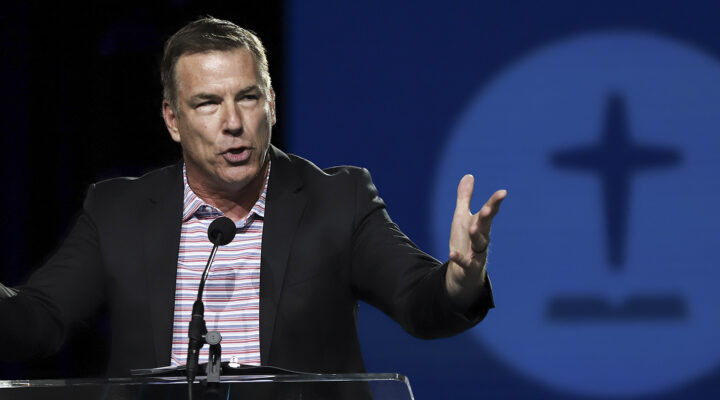With four candidates already announced for this summer’s election of a new Southern Baptist Convention president, the field expanded again April 2 with an announcement by Bruce Frank, pastor of Biltmore Baptist Church in metro Asheville, N.C.
Frank chaired the SBC’s first Sexual Abuse Response Task Force and played a key role in urging the SBC Executive Committee to waive attorney-client privilege in the independent investigation conducted by Guidepost Solutions in 2021 and 2022. For that alone, Frank is disliked by the most conservative wing of the SBC, which includes some who believe the sexual abuse “crisis” has been overblown and that the SBC cannot be responsible for what happens in each of its 47,000 congregations.

Bruce Frank
The most conservative wing also doesn’t like Frank because he opposes ratification this summer of the Law Amendment that would enshrine in the SBC’s Constitution a ban on women serving as pastors or preaching in any SBC church.
In response to Frank’s candidacy announcement on X, Christopher Calvin Reid wrote: “You oppose biblically orthodox positions regarding gender roles in ministry that are set by the Scriptures. … I don’t understand why you would want to run given that 90% of the SBC churches hold a contrary position to your own.”
Frank replied: “Actually, Christopher, I don’t oppose those biblical gender roles at all. I practice them personally as well as in our church. The LA imo is easily manipulated & not an improvement on BF&M2k.”
LA is Law Amendment, and BF&M2k is the 2000 update to the Baptist Faith and Message, the SBC’s doctrinal statement.
In the announcement of his intent to run, Frank said one of his goals if elected is to support “a renewed commitment to an uncompromising and cooperative complementarianism.”
Complementarianism is the belief that God created men and women for different roles in home and church, including allowing only men to serve as pastors and preachers.
“Southern Baptists are clear about their complementarian convictions and must remain so,” he wrote. “But we don’t need to take measures which do more to divide than guide. We can and should affirm complementarianism without restructuring the basis of our cooperation.”
His other goals, he said, would be to focus on the Great Commission, Jesus’ command to go into all the world and teach and baptize and make disciples; to emphasize church revitalization; and to keep working tenaciously on the issue of sexual abuse reform.
“We need to have tenacity in making our churches the safest place possible,” he wrote. “We have made some significant progress in regard to sexual abuse reform, primarily on the state and associational levels. With only about 3% of sexual assaults ever leading to a felony conviction, we need to find a workable way to have a ministry check website. This can help greatly in preventing abusers who have a high recidivism rate from simply being passed onto another church. The messengers voted for this overwhelmingly in 2022.”
Just accomplishing those recommendations of his task force has proved more politically and structurally difficult than anyone imagined. The current task force has been assailed from one side for little visible evidence of progress and from the other side for acting like there is anything the SBC can and should do.

Clint Pressley, Jared Moore, Mike Keahbone, David Allen
Current SBC President Bart Barber is serving his second consecutive term and is ineligible to be elected for another term when the SBC gathers June 11 in Indianapolis.
Previously, four pastors had thrown their hats in the ring for the high-profile volunteer role. SBC presidents are elected to one-year terms with an option to be reelected to a second term.
Previously announced candidates are David Allen, former preaching professor at Southwestern Baptist Theological Seminary; Jared Moore, senior pastor of Homesteads Baptist Church in Crossville, Tenn.; Clint Pressley, senior pastor of Hickory Grove Baptist Church in Charlotte, N.C.; and Mike Keahbone, pastor of First Baptist Church of Lawton, Okla.
Frank shares much in common with Pressley, including being North Carolina pastors. Both Frank and Pressley — along with Oklahoma pastor Keahbone — are viewed as institutional candidates. All three have been involved in leadership roles previously. Allen and Moore are perceived as more conservative candidates and will appeal to those who think the SBC is drifting into liberalism and “wokeness.”
The election almost certainly will require a runoff ballot, as past history shows it is difficult for anyone to get the 51% of the vote required for election when there are so many candidates.
Related articles:
Southern Baptists approve sexual abuse response and debate doctrinal parameters


